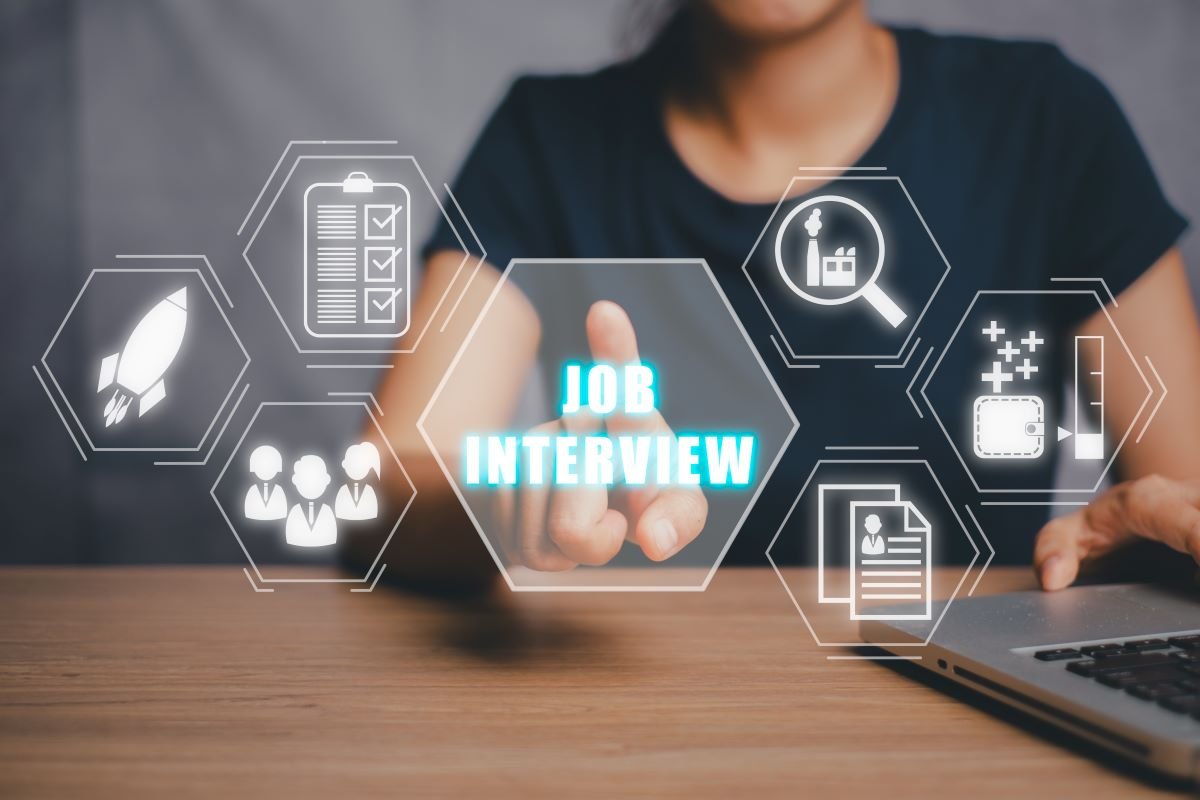Responding to such an open-ended request to talk about yourself can feel overwhelming. You might wonder: What exactly are they looking for? Should I deliver a full biographical recap of my career, complete with dream casting for the movie version?
Your interviewer doesn’t need to know you’ve already picked Zendaya to play you in the film adaptation of your life. But you can (and should) prepare ahead of time so you can turn this common opening question into an opportunity—setting yourself up for a strong interview. Here’s how to answer “Tell me about yourself” the right way.

Why interviewers ask this question
It’s no accident that this question usually comes first. “It helps them ease into the actual interview,” says leadership development coach Alina Campos, founder of Rising. “It’s a way to transition from small talk, especially for less experienced recruiters or hiring managers. The interviewee might be nervous, but the interviewer is also trying to find their footing.”
This question also helps guide the conversation. “Your response shapes their next question,” says Muse career coach and BetterWorks Labs founder Al Dea. A strong answer can spark follow-up questions, keep the discussion flowing naturally, and help interviewers get to know you better.
(Looking for your next role? Find more opportunities on The Muse »)
Common variations of “Tell me about yourself”
Sometimes, they’ll ask it directly: “Tell me about yourself.” But interviewers might phrase it differently while still asking the same thing, such as:
- “I have your resume here, but tell me more about yourself.”
- “Walk me through your resume.”
- “I’d love to hear more about your journey.”
- “Tell me a little more about your background.”
- “Describe yourself.”
How to answer “Tell me about yourself”
You’ve got an interview coming up, and you know this question is likely coming first. Since it sets the tone, you want to make a great impression. “Most hiring decisions are made within the first minute,” says Muse career coach and recruiter Steven Davis.
Here’s how to craft a strong answer:
1. Tailor your answer to the role and company
“When interviewers ask this, they really mean: Tell me about yourself as it relates to this job and company,” says Muse career coach Tina Wascovich. “They’re giving you a chance to clearly explain why you’re qualified.”
To do this, study the job description, research the company, and frame your story in a way that highlights why you’re interested and how your skills align. For example, if sustainability is a big focus for them, briefly mention any green initiatives you’ve worked on or care about.
“This is your best opportunity to be direct and share your goal—but make sure it aligns with theirs,” Davis says. You might have a general template, but tweak it for each interview.
“If they emphasize culture, weave that into your answer,” Campos suggests. Look for keywords—do they call themselves a tech company or startup, a consumer brand or online retailer?
“The best answers show they truly understand the role,” Campos says. “It makes me more engaged because I can see the conversation going somewhere meaningful.”
2. Know your audience (aka the interviewer)
You might hear this question at every stage—from the initial screen to the final round—but your answer should adapt.
- For a recruiter unfamiliar with the technical details, keep it broad.
- For a hiring manager, dive deeper into relevant skills.
- For an executive, connect your experience to the company’s bigger mission.
You can also refine your response based on earlier conversations. Campos suggests adding something like: “When I spoke with [Name], it really stood out to me that…”
3. Keep it professional
The unspoken part of this question is: “…as it relates to this job.” So keep your answer work-focused. In some countries, personal details might be expected, but in the U.S., avoid discussing family or hobbies unless it’s directly relevant.
4. Speak with passion
Staying professional doesn’t mean sounding robotic. Share what excites you about the work or company—it helps you stand out.
Wascovich recalls a special education administrator who was inspired by her own childhood teachers. “That personal connection made her story memorable.”
You don’t need a long backstory, but a touch of enthusiasm helps. “People don’t want to talk to robots—they want humans,” Dea says. “I love hearing someone say, ‘I’ve loved marketing since I was a kid.’”
Campos agrees: “If you’re genuinely passionate about the company’s mission, this is the perfect place to mention it.”
5. Don’t ramble
Avoid reciting your entire career history. “Most people treat it like a dissertation on their resume,” Davis says—which is a sure way to lose the interviewer’s interest.
Campos notes that your answer also hints at how you communicate in meetings. Will you ramble for 10 minutes every time someone asks a question?
There’s no magic length, but Dea finds that after 1.5–2.5 minutes, people start losing steam. Watch for cues—if they seem distracted, wrap up. If they perk up at a certain point, expand on that.
6. Practice, but don’t memorize
Don’t wing it. Think through your key points and practice aloud. Davis suggests recording yourself, then listening later for clarity and impact.
Better yet, rehearse with a friend or colleague. “Hearing feedback helps refine your answer,” Dea says.
But avoid sounding scripted. “New grads might get a pass, but seasoned professionals should sound natural,” Wascovich says.
7. Keep it positive
If you were laid off or fired, save that explanation for later. “This is your first impression—you don’t need to share everything upfront,” Campos says.
And never badmouth a past employer. Starting with “My boss was a nightmare” is a major red flag.
“Tell me about yourself” sample answers
Theory is great, but what does this look like in practice? Here are some examples:
Example #1: Similar role, new company
*“Sure! I’ve always loved writing and public speaking—even in high school. In college, I edited the school paper, where I honed my writing and team management skills.
After graduation, I joined Acme as a social media manager, creating content for their blog. I volunteered to help with a product launch’s communications plan, which sparked my interest in product marketing.
After switching to product marketing and leading two successful launches last year, I realized I’m ready for a new challenge. I thrive working on products I personally use—and since I’m a big fan of yours, I was thrilled to apply.”*
Example #2: Agency to in-house transition
“I’m currently an account executive at Smith, handling our top client. Before that, I worked at an agency managing three major healthcare brands. While I enjoyed the work, I’d love to go deeper with one healthcare company—which is why I’m excited about Metro Health Center.”
Example #3: Pivoting to a new industry
“I’ve been in marketing for five years, mostly in account and project management. Recently, I was a senior PM at a tech company, overseeing large campaigns and other PMs. Now, I’m eager to explore new industries, especially fintech—which drew me to your agency.”
Example #4: Recent graduate
*“I graduated from Howard in May with a CS major and theater minor. This summer, I interned at a theater nonprofit, where I revamped their ticket sales page. Since launch, purchase time dropped 43%, and satisfaction scores rose 20%.
I’ve loved theater since my first school play in 7th grade (13: The Musical—I played Patrice). I even led The Howard Players senior year. This internship confirmed my passion for merging tech and theater, so I jumped at your junior web developer role.”*
Example #5: Career changer
*“I’ve spent 10 years in SaaS account management, including at my current company, which makes remote collaboration tools. For the past two years, I’ve managed teams and discovered a passion for training.
One of my proudest achievements was creating upskilling workshops for our revenue team, leading to a 22% average revenue increase per participant. Looking back, it makes sense—I tutored and led workshops in college.
Now, I want to transition into HR to focus on training programs. I can’t think of a better place to start than a company whose software I’ve relied on for years.”*
Key takeaways
There’s no single “perfect” answer—it depends on your background. But these elements make your response stronger:
What to include:
- Show why you’re the best fit (skills, experience, and personality).
- Summarize your career path and goals.
- Prove you’ve researched the company.
- Demonstrate clear, engaging communication.
A simple structure:
Career coach Lily Zhang recommends this framework:
- Present: Briefly describe your current role and a recent win.
- Past: Explain how you got here (highlight relevant experience).
- Future: Share why you’re interested in this role/company.
You can adjust the order—if a pivotal moment led you here, start with the past. But always tie it back to the job. “End by making it clear why you’re here,” Dea says. Leave them thinking: “This makes perfect sense.”






